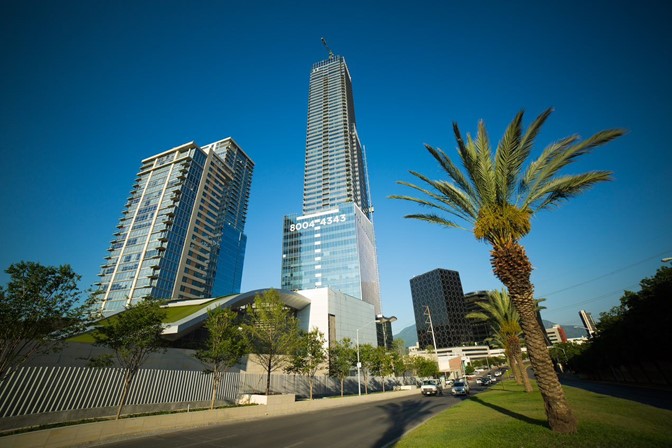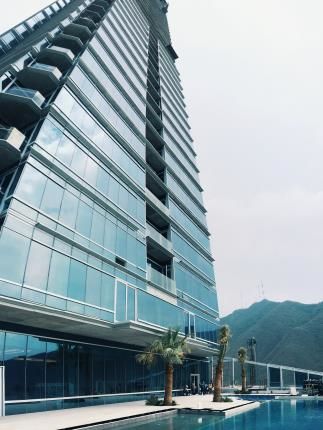Solarban® R100 Optiblue® Glass Helps Mexico’s Second Tallest Skyscraper Reduce Energy Costs by $600,000 per year

The 68-story KOI Tower in Monterrey, Mexico, features a facade composed primarily of double-pane insulating glass units (IGUs) fabricated with Solarban® R100 Optiblue® glass by Vitro Architectural Glass.
PITTSBURGH, PA March 28, 2023 — Proving that a high-performance glass façade can yield a strong return on investment, Vitro Architectural Glass released detailed results of an extensive post-occupancy energy-performance study titled, “True Story of a Successful Façade: A Proven Case of Savings, Comfort and Aesthetics.”

Opened in 2017, KOI Tower is LEED®-certified at the
Silver level and is the tallest tower in Mexico to achieve this distinction.
The analysis documents the energy performance of the 68-story KOI Tower in Monterrey, Mexico, the country’s second tallest building, which features a facade composed primarily of double-pane insulating glass units (IGUs) fabricated with Solarban® R100 Optiblue® glass by Vitro Glass. According to the study, the façade is helping to deliver annual operational cost savings of almost $600,000, which could potentially equate to more than $25.5 million in savings over the life of the building.
While the occupant comfort and aesthetics of high-performance glass facades are well documented, the financial advantages of their use can be difficult to quantify. Seeking to address the misconception that sustainably designed buildings require higher initial investment than more conventional structures, Vitro Glass hired Three Consultoría Medioambiental, an independent environmental consulting firm, to systematically evaluate KOI Tower’s cost savings, profitability and occupant comfort levels over three years of operation and compare them to other glass systems.
Real information on energy consumption/electricity costs, mechanical HVAC equipment costs and glazing types, as well as the comfort level of its occupants, were used to obtain quantitative conclusions and monetize the benefits.
Using Trace 700 virtual building software, the consulting firm found that the installation of Solarban® R100 Optiblue® glass on the tower enabled it to operate with 28% fewer tons of cooling capacity. The related benefits, including the use of smaller HVAC equipment (which requires less labor to install and less power to operate) and smaller duct sizes, translate into annual energy savings of $589,880, according to the firm’s modeling.
The study also showed that Solarban® R100 Optiblue® glass allowed only 49% of the ambient solar heat to pass through its surface. This is a significant reduction compared to the baseline performance of 12-millimeter uncoated monolithic clear glass, which showed 76% of the building’s total floor thermal load entering through the glass façade.
To further measure solar radiation, thermal comfort and natural lighting, Three Consultoría Medioambiental utilized Integrated Environmental Solution’s IESVE7 program. Using this software, the firm calculated a 15.7% improvement in thermal comfort and a 13.7% reduction in glare as compared to the baseline 12-millimeter clear monolithic glass. The firm’s analysis also determined that Solarban® R100 Optiblue® glass helped provide thermal comfort to building occupants 90% of the time, despite Mexico’s warm, semi-arid climate.
“The evidence collected with this study demonstrates that it is possible to have a high-performing glazing system and recover your investment immediately, in addition to enjoying the constant savings and qualitative benefits (comfort) that this type of glass provides,” the study stated.
Further quantifying the building’s high level of sustainability, the study found that more than 73,000 tons of carbon emissions will be mitigated over the life of the structure, which is equivalent to removing 36,979 vehicles from the road.
The double-glazed, insulating glass system also contributes to the structural stability of the wind-challenged KOI Tower.
A neutral-reflective low-e glass with a subtle steel-blue gray aesthetic, Solarban® R100 Optiblue® glass has an excellent solar heat gain coefficient (SHGC) of 0.20, visible light transmittance (VLT) of 30% and a U-Value (thermal insulating value) of 0.29.
Opened in 2017, KOI Tower has 27 floors of leasable commercial space and 37 floors of residential living space. The building is LEED ®-certified at the Silver level and is the tallest tower in Mexico to achieve this distinction.
To view the full study, visit projects.vitroglazings.com/koi-sky-residences. For more information about Solarban® R100 glass, Optiblue® glass and the rest of Vitro Glass’s full line of architectural glasses, visit vitroglazings.com or call 1-855-VTRO-GLS (887-6457).
Solarban® and Optiblue® are registered trademarks owned by Vitro.
LEED® — an acronym for Leadership in Energy and Environmental Design™ — is a registered trademark of the U.S. Green Building Council®.
About Vitro Architectural Glass
Vitro Architectural Glass is the largest glass producer in the Western Hemisphere, manufacturing a range of industry-leading, energy-efficient, high-performance products such as Solarban®, Sungate® and Starphire Ultra-Clear® glasses. Committed to continually raising the industry standard for sustainability, Vitro was the first U.S. glass manufacturer to have its complete collection of architectural glass products earn Cradle to Cradle Certified® status and the first North American manufacturer to publish third-party verified Environmental Product Declarations (EPDs) for flat glass and processed glass products. Additionally, as of April 2024, all Vitro architectural glass products meet the Top 20% Low Embodied Carbon (LEC) material Global Warming Potential (GWP) threshold the U.S. General Services Administration (GSA) established pursuant to the Inflation Reduction Act of 2022 and related guidance from the U.S. Environmental Protection Agency. Vitro operates seven glass production facilities across North America, four residential glass fabrication plants in Canada and one of the world’s largest glass research and development facilities in Pittsburgh, Pennsylvania. For more information, please visit VitroGlazings.com.

Media Contact:
Robert J. Struble
Vitro Architectural Glass
412-820-8138
rstruble@vitro.com
vitroglazings.com
